Mortgage forbearance requests peaked following the implementation of the CARES Act, as homeowners look for ways to access financial assistance in the wake of the COVID-19 outbreak.
The Mortgage Bankers Association announced that forbearance requests rose by approximately 1,270% between March 2 and March 16, followed by another 1,896% climb between March 16 and March 30. The percentage of loans in forbearance also increased from 0.25% to 2.66% between March 2 and April 1, per the MBA’s forbearance and call volume poll.
The data underscores the immediate relief borrowers are hoping to find as they weather the economic turbulence caused by the various mitigation measures implemented to stem the spread of the coronavirus. There is an expectation that the number of these requests will continue to grow at an unprecedented rate in the next few weeks, placing unrealistic cash flow constraints on lenders and their servicers.
The CARES Act, recently signed into law by the Trump Administration, carries with it nearly $2 trillion in economic stimulus initiatives—offering homeowners struggling to meet mortgage payment deadlines and facing foreclosure a range of assistance in the form of foreclosure moratoriums and the right to forbearance.
Forbearance permits debtors with a federally backed loan to delay payments for at least six months if they experience financial problems as a result of the coronavirus. The CARES Act mandates that lenders grant forbearance if requested by the borrower, which set off a cascade of requests as monthly bills came due at the close of March.
Analysts at the Mortgage Bankers Association estimated that the resultant burden on lending organizations could be anywhere from $75 billion to well over $100 billion if 25% of debtors request forbearance for at least six months. This is not an unrealistic number, considering recent reports of 33% of renters missing their April payments.
A variety of mortgage, real estate, and housing groups are pushing federal regulatory agencies to ensure there are available cash funds to mortgage providers who are in need of financial assistance as they work with homeowners and tenants coping with the COVID-19 complications. Fifteen of these groups signed off on a letter urging the Federal Housing Finance Agency, the Federal Reserve and the Department of Treasury to organize a liquidity facility to support lenders that are offering relief initiatives per the CARES Act.
Currently, the federal forbearance requirements that apply to federal related mortgage loans do not apply to privately held debt. Certain states have provided their own prohibitions. For example, many states prohibit the initiation of foreclosure actions during this time period. Some states, such as Nevada, also prohibit any late charge or default penalties such as default interest, effectively creating a quasi-mandated forbearance requirement for all mortgage loans in the state.
Executive branches throughout state governments continue to issue executive orders related to all mortgage loans at unprecedented rates, creating a very uncertain national mortgage landscape. Geraci LLP continues to index and monitor these orders to make sure we can provide accurate, real-time information to our clients, so that they can navigate the deluge of borrower calls and understand their options.






